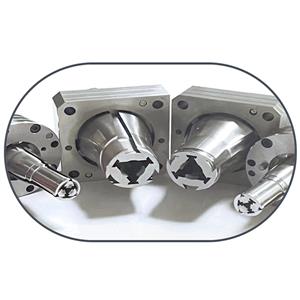The fixed mold half is rigidly mounted on the stationary platen of the injection molding machine, while the movable mold half attaches to the reciprocating platen. This configuration is fundamental for precision systems like precision plastic injection molds, multi-cavity hot runner molds, gas-assisted molds, and collapsible core molds.

Guide System: During operation, the hydraulically driven movable mold half is guided by precision ground guide columns (diameter: 20–50mm, straightness ≤0.01mm/m), ensuring alignment accuracy critical for precision plastic injection molds.
Locking Force: Hydraulic or toggle clamping systems generate 500–5000 tons of force to secure the mold halves, preventing flash in high-pressure applications like multi-cavity hot runner molds.
Cooling System:
Ejection Phase:
After cooling (10–40s), the mold opens, and ejector pins (diameter: 4–10mm) powered by hydraulic cylinders push parts out.
In gas-assisted molds, residual gas pressure assists in part release.
| Mold Type | Key Considerations | Typical Applications |
|---|
| Collapsible Core Molds | Core retraction speed (0.1–0.5m/s) | Pipe fittings, appliance handles |
| Gas Assisted Molds | Gas injection timing (0.5–1s post-injection) | Automotive bumpers, office chairs |
| Precision Plastic Injection Molds | Temperature control (±1°C), vibration dampening | Medical devices, electronics |
| Multi-Cavity Hot Runner Molds | Runner balance, thermal uniformity | Consumer goods, packaging |
Interlock Systems: Proximity sensors ensure mold halves are fully closed before injection, preventing material leakage in precision plastic injection molds.
Process Monitoring: IoT sensors track clamp force, melt pressure, and temperature in real-time for multi-cavity hot runner molds, reducing scrap rates by 20%.
The coordinated operation of fixed and movable mold halves, combined with specialized features in collapsible core molds, gas-assisted molds, precision plastic injection molds, and multi-cavity hot runner molds, enables the production of complex plastic parts with unmatched precision and efficiency. This mechanism forms the backbone of modern plastic manufacturing, driving innovation across industries.


